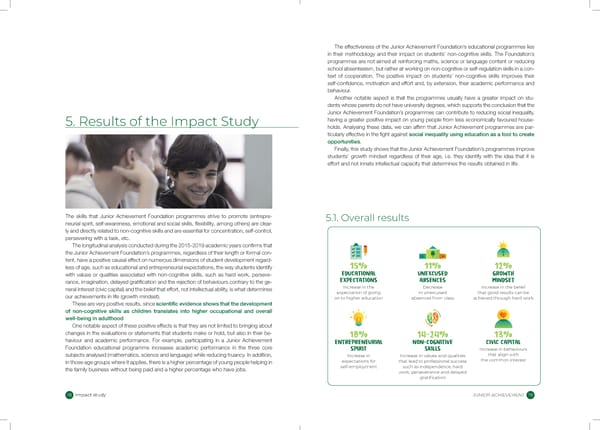The effectiveness of the Junior Achievement Foundation’s educational programmes lies in their methodology and their impact on students’ non-cognitive skills. The Foundation’s programmes are not aimed at reinforcing maths, science or language content or reducing school absenteeism, but rather at working on non-cognitive or self-regulation skills in a con- text of cooperation. The positive impact on students’ non-cognitive skills improves their self-con dence, motivation and effort and, by extension, their academic performance and behaviour. Another notable aspect is that the programmes usually have a greater impact on stu- dents whose parents do not have university degrees, which supports the conclusion that the Junior Achievement Foundation’s programmes can contribute to reducing social inequality, ׃ؘ Results of the Impact Study having a greater positive impact on young people from less economically favoured house- holds. Analysing these data, we can af rm that Junior Achievement programmes are par- ticularly effective in the ght against social inequality using education as a tool to create opportunities. Finally, this study shows that the Junior Achievement Foundation’s programmes improve students’ growth mindset regardless of their age, i.e. they identify with the idea that it is effort and not innate intellectual capacity that determines the results obtained in life. The skills that Junior Achievement Foundation programmes strive to promote (entrepre- ׃.1. Overall results neurial spirit, self-awareness, emotional and social skills, exibility, among others) are clear- ly and directly related to non-cognitive skills and are essential for concentration, self-control, persevering with a task, etc. The longitudinal analysis conducted during the 2015-2019 academic years con rms that the Junior Achievement Foundation’s programmes, regardless of their length or formal con- tent, have a positive causal effect on numerous dimensions of student development regard- 15% 11% 12% less of age, such as educational and entrepreneurial expectations, the way students identify with values or qualities associated with non-cognitive skills, such as hard work, perseve- EDUCATIONAL UNEXCUSED GROWTH rance, imagination, delayed grati cation and the rejection of behaviours contrary to the ge- EXPECTATIONS ABSENCES MINDSET neral interest (civic capital) and the belief that effort, not intellectual ability, is what determines Increase in the Decrease Increase in the belief our achievements in life (growth mindset). expectation of going in unexcused that good results can be on to higher education absences from class achieved through hard work These are very positive results, since scienti c evidence shows that the development of non-cognitive skills as children translates into higher occupational and overall well-being in adulthood One notable aspect of these positive effects is that they are not limited to bringing about changes in the evaluations or statements that students make or hold, but also in their be- 18% 14-24% 13% haviour and academic performance. For example, participating in a Junior Achievement ENTREPRENEURIAL NON-COGNITIVE CIVIC CAPITAL Foundation educational programme increases academic performance in the three core SPIRIT SKILLS Increase in behaviours subjects analysed (mathematics, science and language) while reducing truancy. In addition, Increase in Increase in values and qualities that align with in those age groups where it applies, there is a higher percentage of young people helping in expectations for that lead to pr ofessional success the common interest the family business without being paid and a higher percentage who have jobs. self-employment such as independence, hard work, per severance and delayed gratification 18٪٪٪UǼȬƇƤɅ٪ȷɅɍƫɬ JUNIOR ACHIEVEMENT 19
 Junior Achievement Foundation Page 9 Page 11
Junior Achievement Foundation Page 9 Page 11